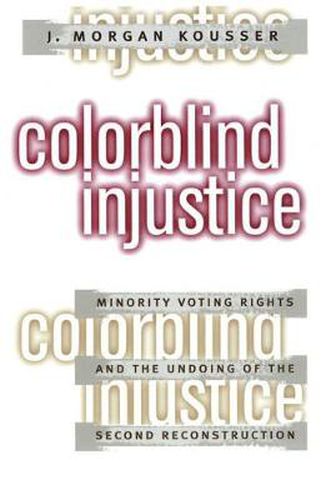Readings Newsletter
Become a Readings Member to make your shopping experience even easier.
Sign in or sign up for free!
You’re not far away from qualifying for FREE standard shipping within Australia
You’ve qualified for FREE standard shipping within Australia
The cart is loading…






Challenging recent trends both in historical scholarship and in Supreme Court decisions on civil rights, J. Morgan Kousser criticizes the Court’s
postmodern equal protection
and demonstrates that legislative and judicial history still matter for public policy. Offering an original interpretation of the failure of the First Reconstruction (after the Civil War) by comparing it with the relative success of the Second (after World War II), Kousser argues that institutions and institutional rules–not customs, ideas, attitudes, culture, or individual behavior–have been the primary forces shaping American race relations throughout the country’s history. Using detailed case studies of redistricting decisions and the tailoring of electoral laws from Los Angeles to the Deep South, he documents how such rules were designed to discriminate against African Americans and Latinos. Kousser contends that far from being colorblind, Shaw v. Reno (1993) and subsequent
racial gerrymandering
decisions of the Supreme Court are intensely color-conscious. Far from being conservative, he argues, the five majority justices and their academic supporters are unreconstructed radicals who twist history and ignore current realities. A more balanced view of that history, he insists, dictates a reversal of Shaw and a return to the promise of both Reconstructions. |The first book-length study of the Supreme Court’s
racial gerrymandering
decisions as well as the first sustained comparison of the First and Second Reconstructions.
$9.00 standard shipping within Australia
FREE standard shipping within Australia for orders over $100.00
Express & International shipping calculated at checkout
Challenging recent trends both in historical scholarship and in Supreme Court decisions on civil rights, J. Morgan Kousser criticizes the Court’s
postmodern equal protection
and demonstrates that legislative and judicial history still matter for public policy. Offering an original interpretation of the failure of the First Reconstruction (after the Civil War) by comparing it with the relative success of the Second (after World War II), Kousser argues that institutions and institutional rules–not customs, ideas, attitudes, culture, or individual behavior–have been the primary forces shaping American race relations throughout the country’s history. Using detailed case studies of redistricting decisions and the tailoring of electoral laws from Los Angeles to the Deep South, he documents how such rules were designed to discriminate against African Americans and Latinos. Kousser contends that far from being colorblind, Shaw v. Reno (1993) and subsequent
racial gerrymandering
decisions of the Supreme Court are intensely color-conscious. Far from being conservative, he argues, the five majority justices and their academic supporters are unreconstructed radicals who twist history and ignore current realities. A more balanced view of that history, he insists, dictates a reversal of Shaw and a return to the promise of both Reconstructions. |The first book-length study of the Supreme Court’s
racial gerrymandering
decisions as well as the first sustained comparison of the First and Second Reconstructions.